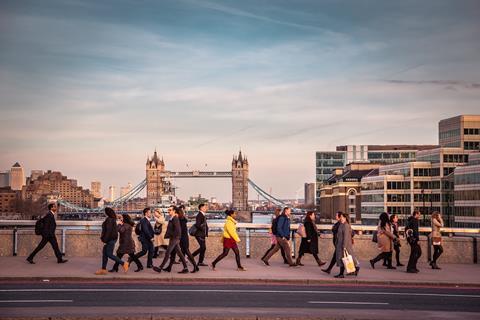Recent research has cast doubt on the efficiency of working from home. Brendan Kilpatrick, senior partner at architect PRP, says we need to get back to the office – most of the time

Spring is just around the corner and it feels like the workers of the UK are at last emerging from their winter slumbers, sniffing the air, and getting back to something close to normal working conditions. The commuter trains are filling up once more and footfall on the streets of London is noticeably increasing.
Our practice is resuming a four-day week in the office today (31 January), with one day working from home – which is not to be confused with “a day off” as I have heard it referred to. This raises the question of the degree of flexibility that should be given to staff post-pandemic now that everyone has had more than enough time to assess their position in the world and appraised their work/life balance to some degree.
Most people think that this needs to mean working differently from before and I would not disagree; particularly if it comes with a re-appraisal of what we are doing to our planet and our collective responsibility to stop the rot. There is a churn of movement as staff look for greener pastures.
I visited the offices of a large London practice just before the Omicron lockdown. An office floorplate that could accommodate more than 100 staff had three desks occupied, one of which was attended by the receptionist. The company was operating a completely flexible WFH policy. Its staff were clearly voting with their feet and electing not to use them.
Teams that had been slaves to Teams could once again interact in a cooperative and insightful manner
This made me wonder just how long an architectural practice could survive while operating on such a basis. When our staff were able to return to the office last year, it was on the basis of a four-day week.
There was a buzz in the studio that was akin to your first day back at school following a long summer break. The vast majority of our people were so glad to be back.


Teams that had been slaves to Teams could once again interact in a cooperative and insightful manner. Wrong directions on projects could be quickly curtailed.
Young members of staff could learn by seeing and hearing in live conditions rather than snatching snippets of intelligence on-line. Proper mentoring could resume. Clients could not wait to have face-to-face meetings in our studios.
>> Also read: Is working from home causing a planning gridlock?
>> Also read: Let’s switch ‘working from home’ to ‘working near home’
Recent research is now casting doubt on the efficiencies of WFH. Our ability to work remotely has certainly helped to save the economy, but it should never be considered a permanent solution.
One of our senior staff members complains about Teams fatigue emanating in a number of forms; from diary hijacking because it looks like a spot is available; from meetings for the sake of meetings; and from meetings which are mob-handed with attendees, many of whom should be getting on with some real work.
The return to the office is important to re-vitalise the wider economy and to get London back to making the most of the world-beating abilities that it possesses
Online working will certainly continue to a significant degree and the ability to connect quickly with clients or co-consultants will be a boon in future hybrid working arrangements. International business travel will remain permanently reduced because of the massive savings on travel time and hotel accommodation – seen by many as an important ingredient in addressing climate change.
But the return to the office is important to re-vitalise the wider economy and to get London back to making the most of the world-beating abilities that it possesses. The city attracts the brightest individuals, it produces the best ideas in a collaborative creative environment and a return to the office gets the support and service industries around us permanently off life support.
So WFW rather than WFH. Hybrid for sure, but with a small “h”.
Brendan Kilpatrick is a senior partner at PRP, based in Smithfield with offices in Manchester and Surrey





























No comments yet